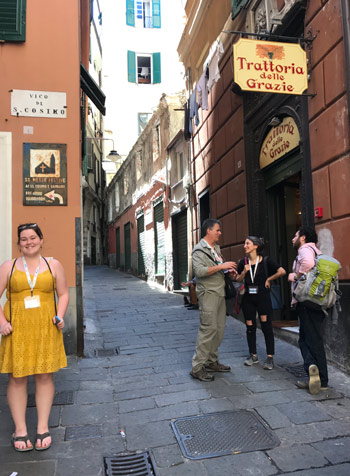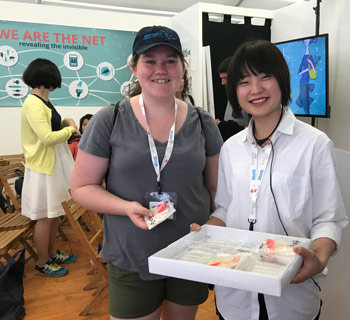Maine Coast Students at Slow Fish Conference in Italy

Betsey Brown, left, of Narraguagus High School at Slow Fish in the ancient port city of Genoa, Italy. Betsy helped put on a video workshop conducted in three languages for the international delegates. Paul Molyneaux photo
On May 17, a young Maine fisherman, eighteen-year-old Betsey Brown, of Narraguagus High School, landed at the bi-annual Slow Fish conference in Genoa, Italy. Accompanied by staff from the Maine Center for Coastal Fisheries (MCCF) Betsey was chosen to represent more than sixty students from the eight coastal high schools that participate in the MCCF’s Eastern Maine Skippers Program (EMSP)—an education project that helps provide relevant learning experiences to students in Maine’s fishing communities.
Slow Fish, which began in 2004 as a part of the larger Slow Food movement, is based on the idea that if people want good seafood, they have to protect the ecosystems and cultures that create it. This year, Slow Fish invited an EMSP student to come and present on how young people on the coast of Maine will maintain healthy fisheries in the 21st century, and Betsey Brown, who fishes with her father aboard the Tricia Clark, a forty-foot longline and tuna boat, made the journey to Italy.
The Slow Fish team welcomed Betsey and MCCF staffers Christina Fifield and Paul Molyneaux to the conference, where for four days, delegates from places as diverse as Uganda, Japan, and Denmark described how they were holding their own by restoring environmental health to their waters and maintaining access to resources—stories Betsey is sharing with her classmates and community. Betsey shared her own experiences of working on the water, and talked about the importance of her community’s story. In addition to conducting a translated interview with plankton expert Pierre Mollo, of Brittany, France, Betsey helped put on a video workshop conducted in three languages, and talked informally with other delegates.

Betsey Brown, left, and another international participant in the Slow Fish Genoa event. Low Impact Fishermen of Europe (LIFE) expressed an interest in seeing more information exchanges between both sides of the Atlantic. Paul Molyneaux photo
In the Maine delegation’s presentation, MCCF staffers described the Eastern Maine Skippers Program—which works in collaboration with Deer Isle Stonington High School and the consulting company, Rural Aspirations. With help from experienced people in their communities EMSP students are engaged in solving real world problems; they are building a low impact beam trawl for shrimp, distilling biofuel from kelp, and making films about the costs and benefits of scallop aquaculture, among other things. After Betsey described the documentary she and her classmates made about the sustainability of scallop harvest methods, a Dutch woman in the audience was so moved she broke down in tears. “In our community young people have given up on fishing,” she said. “I’m so happy to see this.”
Jeremy Percy, a former trawlerman and now director of the NGO, Low Impact Fishermen of Europe (LIFE) expressed particular interest in learning more about the Maine Center for Coastal Fisheries and its EMSP program. Facing similar problems for small scale fishers, Jerry says he’d like to see more information exchange between both sides of the Atlantic.
While EMSP aims to strengthen community connections and help students become the best resource stewards they can be on a local level, fisheries issues have become global, and the program hopes to offer more participants a chance to meet fishing people from around the world.
